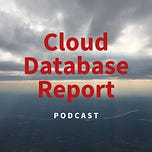In this episode of the Cloud Database Report Podcast, I talk with Chris Gladwin, cofounder and CEO of Ocient, about high-performance data analysis at hyperscale, involving petabytes, exabytes, and trillions of rows of data.
The conversation explores use cases for these extreme datasets, software and hardware architecture, Ocient's cloud platform model, and performance comparisons to Snowflake and other cloud database providers.
Ocient is a software startup that specializes in complex analysis of the world's largest datasets. Early adopters are hyperscale web companies and enterprises that need to analyze data sets of billions or trillions of records.
Prior to Ocient, Gladwin was the founder of object storage vendor Cleversafe, acquired by IBM in 2015. That experience with mega-size data storage carried over to Ocient, whose software is optimized to run on NVMe solid state storage, industry standard CPUs, and 100 GB networking.
Key topics from the interview include:
Ocient is focused on very large datasets—petabytes, exabytes, and trillions of rows of data
Leading uses cases include digital ad auctions, telecom network traffic, vehicle fleets
Ocient uses a computer adjacent architecture with storage and compute in the same tier
Ocient is available on premises, in the cloud, and as a managed service
What’s ahead for Ocient in 2022
Quotes from the podcast:
"Our focus is on complex analysis of at least hundreds of billions of records, if not trillions or tens of trillions or hundreds of trillions. That's that's territory that was previously impossible."
"Billions is kind of the last scale at which humans can actually make or touch data that big. It's very hard to do, but it's possible. But at trillions scale, it's just not possible."
"I've challenged people to give me an example of some new technology, some new version of something that makes less data than the version it replaces."
"5g is arguably the largest technology infrastructure investment ever. It's going to create a whole lot more data, at least 10 times the amount of data, for everything."
"What we see is, over time, data analysis is going to occur on these hyperscale systems."















Share this post